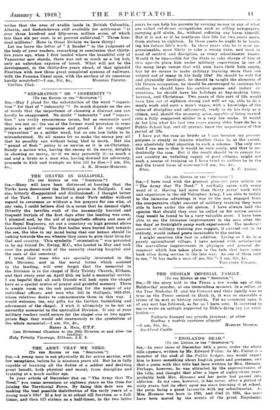THE ARMY THAT WE NEED.
(To ma Emma or Ma "Srxrsmx."3 Sea —A young man is not physically fit for active Denim, with few ermptions, before he is nineteen years old. But he is fully capable of learning all the duties of a soldier and deriving great benefit, both physical and moral, from discipline and training at a much earlier age. • In your article of December 21st on "The Army that We Need," you name seventeen or eighteen years as the time for joining the Territorial Force. By Sting this date are we making the best possible distribution of the early years of a young man's life? If a boy is at school till fourteen as a full- timer, and then till sixteen as a half-timer, in the two latter years he can help his parents by earning mosey in any of what are called cul-devac occupations, such as selling newspapers, carrying golf clubs, &es., without suffering any harm himself. But it is not so if he continues this life for two years more, from sixteen to eighteen. In those years he ought to be learn- ing his future life's work. In those years also he is most im- pressionable, most likely to take a wrong turn, and most in need of control and discipline, as every sohoolmaster knows. Would it he Impossible for the State to take charge of him nt this age—to place him under military supervision in one of the many large clamps that will soon have their huts empty, but by no means to make military training more than one subject out of many in his daily lifer He should be well fed and physically developed, he should lo taught the elements of his future occupation, he should be encouraged to continue his studies, he should have his outdoor• games and indoor re- creations, lie should have his holidays at hey-making time, harvest, and Christmas. Two years of this sort of life would turn him out at eighteen strong and well set up, able to do a man's work and earn a man's wages, with a knowledge of the value of discipline and self-control. ready to do his May as e citizen, and, should the necessity arise, capable of being turned into a fully competent soldier in a very few weeks. It would do for him what his last two years among elder boys do for a Public School boy, and all parents know the importance of this period of life.
I have put the case as briefly as I can because my present purpose is simply to inquire whether there Is. at the outset. any absolutely fated objection to such a scheme. The only one that I can me is that it would be very costly, and that is un- doubtedly the case. But if the result should be to ensure for our country an unfailing supply of good citizens• might not such a course of training as I have tried to outline be in time end the truest form of economy?—I am, Sir, &c.,


























 Previous page
Previous page